Venezuela Part 1 - Los Testigos, Margarita, CumanŠ
12th January - 11th February 2004
Before we left for Venezuela we debated whether to invest in a new hot water tank for the boat. This involved making mock-ups of the various tank sizes available out of cardboard, to see if they would fit anywhere aboard. Finally, after days of deliberation, we decided not to bother and to stick with the cold water showers we'd been enduring for 18 months, since the last tank split. This was a decision we soon regretted when we got to Venezuela and found that the water in our tanks was nowhere near as warm as it had been in the rainy season before we left for the UK! Of course the standard voltage in Venezuela for electrical appliances is 110V not the 220V produced by our generator, so it seems we'll have to toughen up and get used to it!
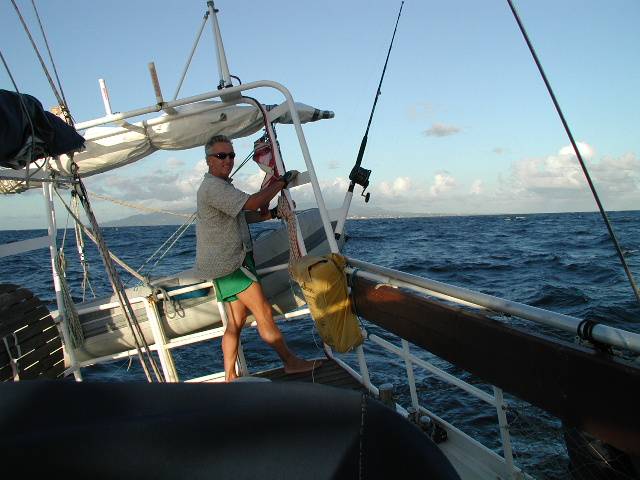
"Can you please stop this boat from rolling? I can't concentrate on my fishing!"
We left Grenada on the evening of 22nd January for the overnight passage to the first landfall in Venezuelan territory, the Los Testigos islands (the Witnesses), about half way between Grenada and the Venezuelan mainland. The sail was downwind and we were able to pole-out our genoa (the big sail at the front) with our spinnaker pole, to catch the maximum wind. We haven't quite got around to repairing the pole's end fitting since it broke two years ago in the Atlantic, but the temporary repair is holding up and working just fine! One day we'll get around to it!
As soon as we left it was dusk, a good time for fishing, so despite the heavy rolling in a confused swell, Phil soon had his fishing lines out. Earlier in the day we had bought the only loaf of bread we were able to find that morning in Grenada. Only when we tucked into our evening snack did we realise that the loaf we'd bought was actually a sweet type of bread, filled with raisons, which made our cheese and pickle sandwiches taste a little unusual.
During the night the wind dropped off and we ended up having to motor the rest of the way to Los Testigos. We made landfall at around 8 am and after breakfast went ashore to check in with the Coastguard. The islands were even more peaceful than during our last visit, with only a handful of visiting yachts and we spent a couple of quiet days anchored just off the main town, which consisted of around 10 houses and the coastguard station. There were, however, plenty of streetlights illuminating the night, although there was no actual street to speak of!
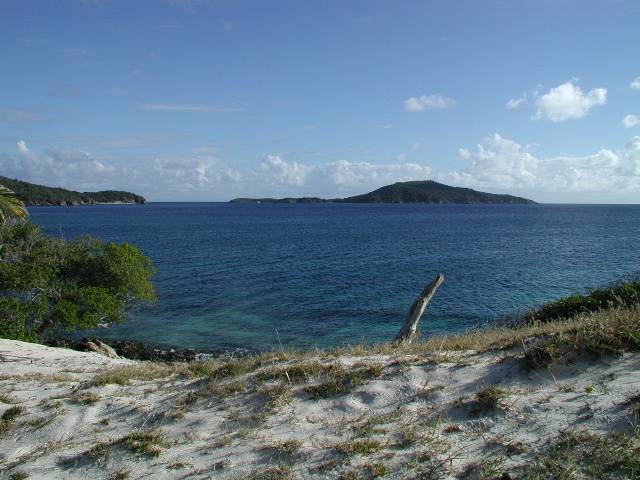
Los Testigos Percy's Breakfast Time
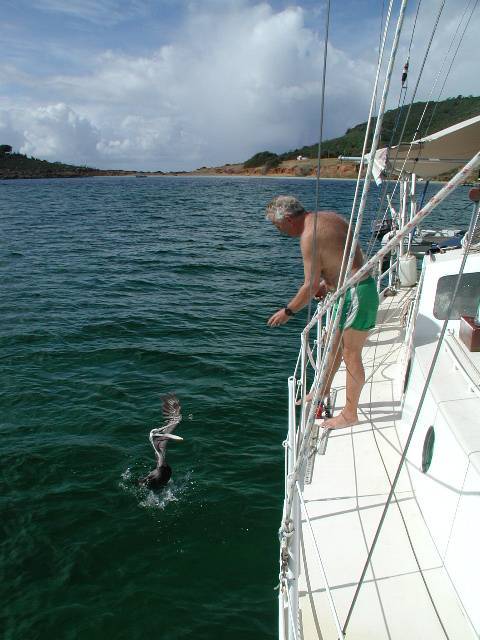
The peace of the islands was shattered one morning at 4 am, when our automatic bilge alarm suddenly went off, warning us that water was somehow getting into the boat. Two sleepy people never moved so fast! The floorboards were up in seconds and we found the aft bilge had several inches of seawater in it. We quickly traced the ingress of water to the engine cooling water pump, which had developed a leak, so fortunately were able to switch off the water inlet to stop any more water coming in and leave further investigation to the next morning. An alarmed automatic bilge pump is an important safety feature and to be sure we immediately know that the alarm sounding is the one for the bilge, ours plays a selection of 10 American songs, instead of just a normal beep. Once the music changes from the "Yellow Rose of Texas" to "Yankee Doodle", we know we have a problem needing further investigation. Next day we cleaned up the paper gaskets on the pump as we didn't have any spares or gasket material on board at the time. The pump would be put to further test on the trip to Margarita.
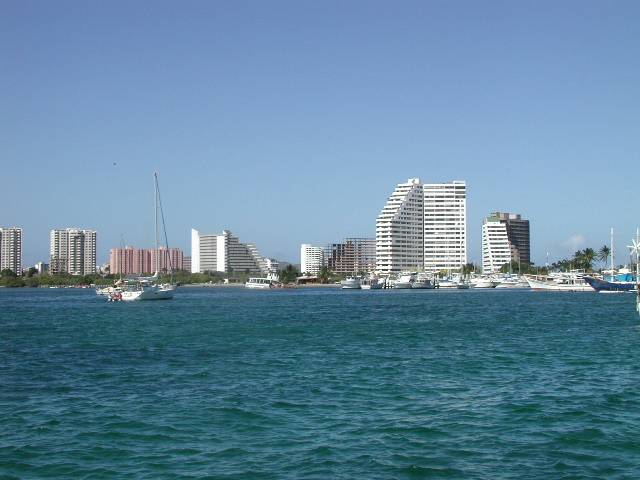
Porlamar, Margarita - a shock to the system after Los Testigos!
As on previous visits, the "Margarita Experience" was mostly retail therapy, interspersed with visits to the excellent "Jak's Restaurant" for refreshments. It was such a novelty for us to be able to afford to eat out. On our last visit the cost of living in Venezuela enabled us to live the lifestyle we had when we were both working and living in the UK; trips to the cinema, restaurants, shopping trips for new clothes and so on. Now with the "unofficial" exchange rate in Venezuela, our pounds were worth more than twice as much as on our last visit 18 months ago.
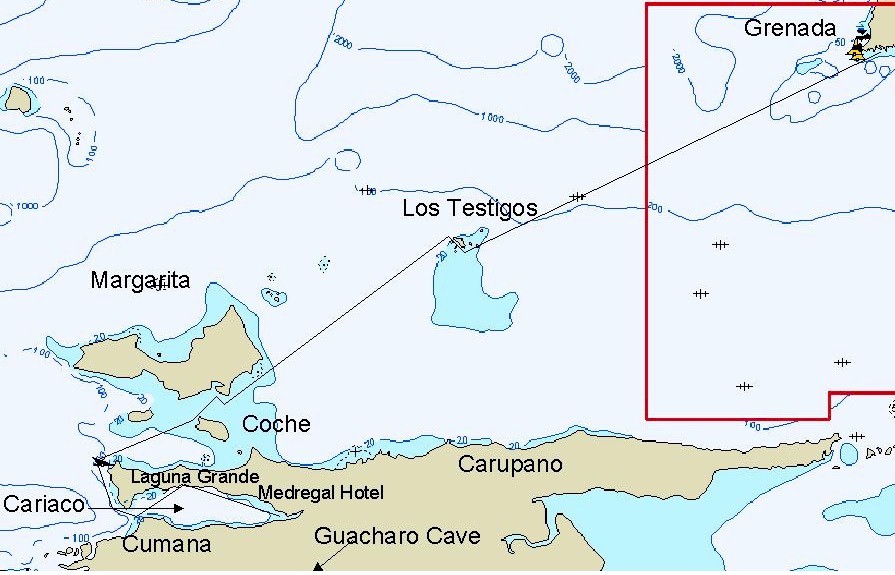
With the help of a very friendly local taxi driver, we managed to get hold of some gasket material, to replace the gaskets on our still leaking water pump. The pump was tested again when we set off to the island of Coche, again under motor. The wind had a very irritating habit of howling all night and dropping off in the early morning when we wanted to move.
We were nervous anchoring at Coche, the island adjacent to Cubagua, where thieves had attempted to steal our outboard engine previously. Coche is also known for boardings and thefts. We chose an anchoring spot where we were surrounded by local fishing boats, with fishermen working and living aboard and were uncertain whether this made us safer or more at risk, but our visit passed without incident. The greatest hazard seemed to be from the air. Our anchoring spot happened to be on the flight path for the local airstrip where a small plane pilot was busy practising landings and take-offs and seemed to be using the gap between Anju's two masts as his mark to line up the runway! Fortunately he seemed to have the hang of the whole landing business.
We ventured ashore to eat lunch in a very friendly and exceptionally good value restaurant and Phil indulged in a plate of octopus tentacles! By the time we returned to the boat, the wind was up to 25 knots and the dinghy ride extremely bumpy - just what's needed after eating a plate full of octopus tentacles!
Once we reached the end of the Areya peninsula and made our turn towards Cumana, the squalls returned and we found ourselves beating in the rain in 25 knots towards Cumana's marina. We were happy to arrive safely in our berth.
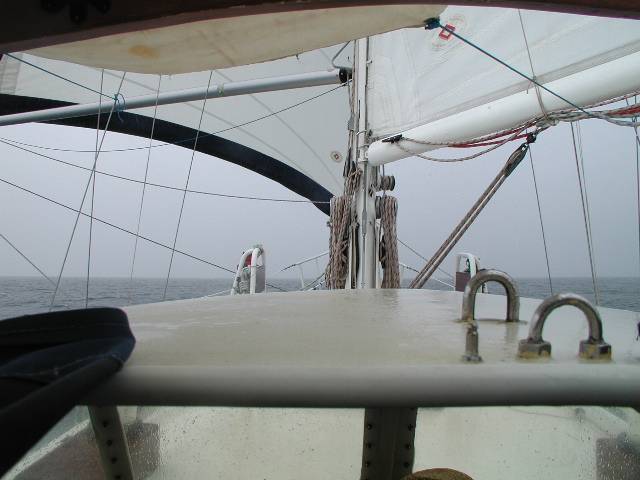
Not every day in paradise is sunny - Bristol Channel Watch Position.
Before we left Cumana, Alex took us on a re-provisioning trip into the city centre. We were surprised to see the supermarkets completely without meat of any kind except turkey. When we asked Alex where we could find some meat, he took us to visit "Mr Carne" (Mr Meat), an excellent butchery by the bustling municipal market. Our shopping list included chicken, steak and mincement but when we asked for the best cut of beef, lomito (fillet) we were told we had to by a whole fillet, about six pounds of meat. Finally we decided to take half as steak and half as mince. Just imagine mincing fillet steak in the UK! Total cost of the lomito was less than £5 and the chilli and burgers made of fillet steak mince certainly did taste good!